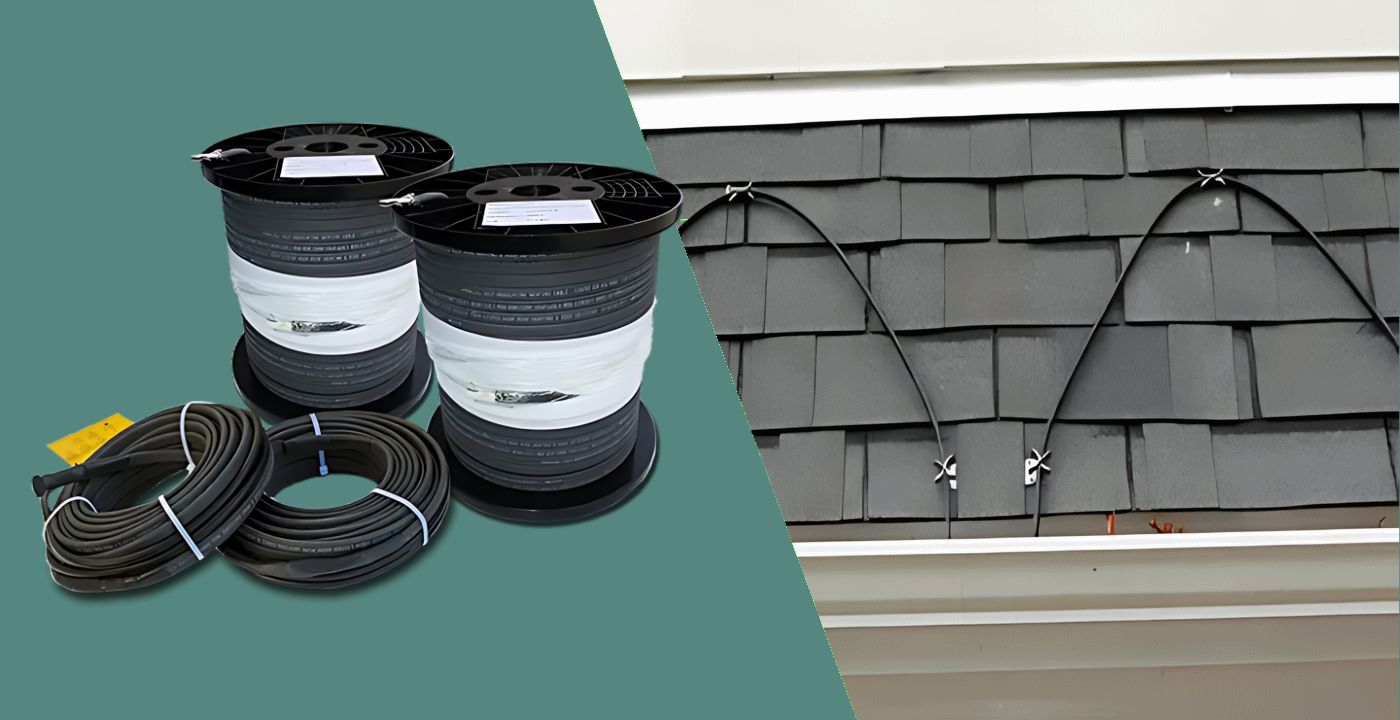Many homeowners struggle to find the right solution for their metal roofs during winter.
The right heat cable can make all the difference – but navigating through all the different options, both good and bad, becomes a bit of a minefield.
We’ll walk you through the best options for keeping your metal roof ice-free and give expert tips on what to avoid.
5 Best Heat Cables for Metal Roofs
1. Green Wave Distribution Roof Heat Tape

Our roof heat tape is a self-regulating solution that quickly reacts to rapid temperature fluctuations.
This makes it particularly beneficial for metal roofs that absorb and lose heat easily, as the cable automatically increases its heat output as temperatures fall and decreases its output as temperatures rise.
The cable is protected against extreme cold, allowing installation in temperatures as low as -40°F (-40°C). Its high-quality thermoplastic jacket resists bubbling for a water-tight seal, reducing the chance of uneven heating.
A robust irradiated conductive carbon core is built to withstand harsh environments, making it suitable for both residential and commercial uses. Its service voltage rating of 110 to 120V ensures compatibility with most power supplies.
Pros
- Adjusts heat output based on temperature
- Flexible and simple to install
- Prevents overheating
- Available in lengths from 50ft to 150ft to suit different roof sizes
- Comes with a 10-year warranty
Cons
- May require periodic inspections to ensure continued effectiveness
Rating
Price
From $4 per ft
2. Drexan HeatTracer MultiTrace Cable

The Drexan HeatTracer MultiTrace cable features a polymer-based inner core that changes its resistance with temperature fluctuation. This ensures it effectively and efficiently melts ice on a metal roof in the harshest weather conditions.
A conductive core, insulating layers, and a protective outer jacket ensure durability and reliability in most environments while its self-regulating technology prevents it from overheating and starting a fire.
This product is certified to all applicable CSA (CUS) standards for use throughout North America and ATEX for global applications.
Pros
- Designed to withstand harsh industrial environments
- Self-regulating properties reduce the risk of overheating/fire hazards
- Suitable for various applications including freeze protection and process maintenance
- Energy efficient
Cons
- Needs careful installation to ensure proper function and longevity
- Takes more effort to cut than other heat cables
Rating
Price
From $3.99 per ft
3. IceStop Self-Regulating Heat Trace Cable

IceStop Self-Regulating Heat Trace Cables has a conductive polymer core that regulates heat output to eliminate hot spots.
This gives you better ice melting control, especially on metal roofs where temperatures change quickly. There’s also no chance of overheating, even when cables are crossed, making operation safe and efficient.
The cable is available with an abrasion and chemical-resistant fluoropolymer (-XT) outer jacket for harsh industrial environments or an economical polyolefin (-X) jacket for less demanding applications.
It’s ideal for residential homes thanks to its straightforward installation and overall durability and safety levels.
Pros
- Resistant to damage during installation
- Parallel circuitry so you can cut to the exact length with no wasted cable
- Maintenance free
Cons
- Cables can suffer from air pockets
- The cable core may degrade over time
Rating
Price
From $11.28 per ft
4. Ice Shield Self-Regulating Roof Heating Cables

Ice Shield is a self-regulating heat cable that adjusts its heat output based on ambient temperatures, making it safe for metal roofs that experience rapid temperature changes.
Its high-quality polymer-based inner core and durable outer jacket withstand harsh environmental conditions and roofs exposed to extreme weather. Resistance to UV radiation and chemical damage ensures long-lasting performance in challenging settings.
The Ice Shield heat cables offer uncomplicated installation and you can cut them to length on-site for a custom fit. This reduces labor costs and minimizes disruption during setup.
Pros
- Well engineered
- Easy to install
- Can be cut to length
Cons
- Adhesives can be unreliable
- Higher initial cost layout
Rating
Price
From $7 per ft
5. MOR-HEAT-TRACE Roof Heating Cable

These cables are built to withstand harsh weather conditions, making them suitable for metal roofs exposed to elements like snow, ice, and fluctuating temperatures.
A robust construction ensures long-term reliability and reduces the need for frequent replacements. As these cables are self-regulating, they provide consistent and efficient heating without burning out. This is important for metal roofs that can be sensitive to excessive heat.
You can install MOR-HEAT-TRACE heating cables on roof edges with minimal effort, making them a versatile solution for preventing ice dams and allowing for proper roof drainage.
Pros
- Various lengths for tailored installation
- Easy to install
- Grounding and thermal cut-off for safety
Cons
- Professional installation recommended
Rating
Price
From $10 per ft
What To Look For When Choosing Heat Cables
With so many options, how do you know which heat tape to choose?
Here are a few points to consider when buying heat cables for a metal roof:
Cable Construction
Not all heat tapes are of equal quality, so choose a product that explicitly mentions compatibility with metal surfaces. Look for a durable core and protective outer jacket for longevity and consistent performance.
Cable Type
Self-regulating cables are safer than constant wattage heat tape as there’s minimal chance of a fire risk. In addition, self-regulating cables are energy-efficient and adjust their heat output when temperatures change.
Safety
Look for UL-listed or CSA-certified brands that are tested and verified by safety organizations.
Temperature Rating
Some areas may need heat tape with a higher temperature rating to effectively melt snow and ice.
Ready To Conquer Winter On Your Metal Roof?
What To Avoid On A Metal Roof
Constant wattage heat tape is not recommended for metal roofs. Here are the key reasons why:
Risk of Overheating and Fires
Constant wattage heat tape maintains a consistent temperature regardless of external conditions.
This can cause overheating and damage to the tape’s insulation, leading to potential electrical faults and fires. Metal roofs, with their high thermal conductivity, increase this risk.
Uneven Heating
Metal roofs are reflective, making them prone to rapid temperature fluctuations. Constant wattage heat tape doesn’t adjust to these changes, leading to uneven heating.
This can lead to uneven deicing or hot spots, causing damage to your roof.
Energy Inefficiency
Metal roofs can naturally shed snow and ice more effectively than other roof types, so they don’t need a constant high power output.
As constant wattage heat tape uses a fixed amount of power regardless of the need for heat, it’s an energy-inefficient option.
Maintenance and Longevity Issues
The static output of constant wattage heat tape makes it prone to premature wear and tear, especially on a metal roof with constantly changing temperatures.
Metal roofs typically have a long lifespan, and using a heat tape that requires constant monitoring and upkeep can be counterproductive.
Frequently Asked Questions
How long do self-regulating heat cables last?
Self-regulating heat cables adjust their power output based on the surrounding temperature, so they tend to have a longer lifespan than constant-wattage cables that operate continuously at maximum power. On average, self-regulating heat cables can last between 10 and 20 years.
Are roof heating cables worth it?
Yes, roof heating cables are beneficial as they prevent ice dams and icicles, reducing the risk of roof damage and potential water leaks. This can also minimize hazards posed by falling icicles.
How do heat cables prevent damage to roofs and gutters?
Heat cables, especially those designed for roofs and gutters, create pathways for melting snow and ice. By preventing the buildup of ice dams and icicles, they reduce the potential for water damage, protect roofing materials, and ensure gutters function optimally.
Watt's Next?
Choosing the right heat cable for your metal roof is crucial for effective snow and ice prevention while ensuring safety and energy efficiency. Self-regulating heat cables stand out as the superior choice for metal roofs due to their ability to adjust to temperature fluctuations, prevent overheating, and provide long-lasting performance.
When selecting a heat cable, consider cable construction, safety certifications, temperature ratings, and ease of installation. Remember that while the initial investment might be higher for quality self-regulating cables, the long-term benefits of energy savings, reduced maintenance, and improved safety make them a wise choice for metal roof owners.
Ready to find the perfect roof deicing solution for your metal roof? Explore our range of Roof Snow Melting & Deicing solutions today.






